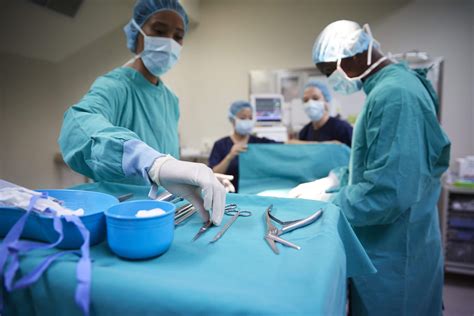Surgical technologists, also known as surgical techs or operating room technicians, play a vital role in the healthcare industry. They work closely with surgeons, anesthesiologists, and nurses to ensure that surgical procedures are carried out safely and efficiently. While formal education and training are essential for becoming a surgical tech, on-the-job learning is also crucial for professional growth and development. In this article, we will explore five ways surgical techs learn on the job.
The importance of on-the-job learning for surgical techs cannot be overstated. As medical technology advances and new surgical techniques are developed, surgical techs must stay up-to-date with the latest procedures and equipment. On-the-job learning allows them to gain practical experience, develop new skills, and improve their overall performance. Moreover, it helps them to build confidence, think critically, and make quick decisions in high-pressure situations.
1. Mentorship and Guidance
One of the most effective ways surgical techs learn on the job is through mentorship and guidance from experienced colleagues. Seasoned surgical techs can provide valuable insights, share their expertise, and offer constructive feedback to new hires. This mentorship can take many forms, including one-on-one training, observation, and hands-on practice.
Mentors can help surgical techs to develop their skills in areas such as patient preparation, instrument handling, and surgical site management. They can also provide guidance on how to navigate the operating room, communicate effectively with the surgical team, and manage stressful situations.

For example, a new surgical tech may be paired with an experienced mentor who has worked in the operating room for several years. The mentor can provide guidance on how to prepare patients for surgery, how to handle instruments during procedures, and how to maintain a sterile environment. The mentor can also offer feedback on the new tech's performance, highlighting areas of strength and weakness.
2. Hands-On Training
Hands-on training is another essential way surgical techs learn on the job. This type of training allows them to practice new skills and techniques in a real-world setting. Surgical techs can participate in training sessions, workshops, and simulations to develop their skills in areas such as suturing, wound closure, and surgical site management.
Hands-on training can be particularly effective when combined with mentorship and guidance. For example, a surgical tech may participate in a training session on suturing techniques, followed by hands-on practice with a mentor.

Hands-on training can also be used to introduce new equipment or technology into the operating room. For example, a hospital may purchase a new surgical robot, and surgical techs may participate in training sessions to learn how to operate the equipment.
3. Observation and Feedback
Observation and feedback are critical components of on-the-job learning for surgical techs. By observing experienced surgical techs and surgeons, new hires can learn new techniques, gain insights into patient care, and develop their critical thinking skills.
Feedback from colleagues and supervisors is also essential for professional growth and development. Surgical techs can receive feedback on their performance, highlighting areas of strength and weakness. This feedback can be used to develop a plan for improvement, set goals, and track progress.

For example, a surgical tech may observe a colleague handling a difficult surgical procedure. The colleague may provide feedback on the tech's performance, highlighting areas for improvement. The tech can use this feedback to develop a plan for improvement, such as practicing new skills or seeking additional training.
4. Cross-Training and Rotation
Cross-training and rotation are effective ways to promote on-the-job learning for surgical techs. By rotating through different surgical specialties or working in different operating rooms, surgical techs can gain exposure to new procedures, equipment, and techniques.
Cross-training can also help to reduce boredom and prevent burnout. Surgical techs can learn new skills, take on new challenges, and develop a greater appreciation for the work of their colleagues.

For example, a surgical tech may rotate through different surgical specialties, such as orthopedics, cardiology, or neurosurgery. This rotation can help the tech to gain exposure to new procedures, equipment, and techniques, and develop a greater appreciation for the work of their colleagues.
5. Continuing Education and Professional Development
Finally, continuing education and professional development are essential for on-the-job learning for surgical techs. By participating in workshops, conferences, and online courses, surgical techs can stay up-to-date with the latest procedures, equipment, and techniques.
Continuing education can also help to promote professional growth and development. Surgical techs can learn new skills, develop their critical thinking abilities, and enhance their patient care skills.

For example, a surgical tech may participate in a workshop on wound closure techniques, or attend a conference on surgical site management. This continuing education can help the tech to stay up-to-date with the latest procedures and equipment, and develop their critical thinking abilities.
In conclusion, on-the-job learning is essential for surgical techs to develop their skills, gain practical experience, and stay up-to-date with the latest procedures and equipment. By participating in mentorship and guidance, hands-on training, observation and feedback, cross-training and rotation, and continuing education and professional development, surgical techs can promote their professional growth and development, and provide high-quality patient care.






What is the importance of on-the-job learning for surgical techs?
+On-the-job learning is essential for surgical techs to develop their skills, gain practical experience, and stay up-to-date with the latest procedures and equipment.
How do surgical techs learn on the job?
+Surgical techs learn on the job through mentorship and guidance, hands-on training, observation and feedback, cross-training and rotation, and continuing education and professional development.
What is the role of mentorship in on-the-job learning for surgical techs?
+Mentorship is critical in on-the-job learning for surgical techs, as it provides them with valuable insights, guidance, and feedback from experienced colleagues.
